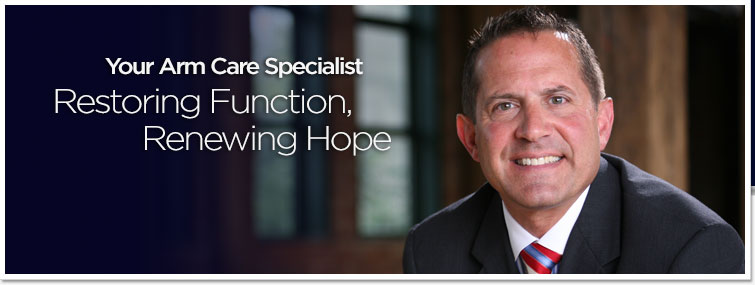NOTICE:
Our Practice has MOVED
Our new location is:
Suite 405
1815 South Clinton Ave
Rochester, NY, 14618.
The NEW phone number is 585-565-3500
Our Practice has MOVED
Our new location is:
Suite 405
1815 South Clinton Ave
Rochester, NY, 14618.
The NEW phone number is 585-565-3500

For appointments call
585.565.3500
Fax Number:
585.434.4081
585.565.3500
Fax Number:
585.434.4081

Orthopaedic Surgeon or Orthopaedist: One or the other or Both---it’s worth knowing!
January 13th, 2013
When it comes to ailments of your Musckuloskeletal system---bones, joints, ligaments and tendons-----or in the case of my practice--your shoulder, hand, or elbow, you may be in need of orthopaedic care.And, this may at times require “Orthopaedic” surgery. If you have a traumatic injury like a severed tendon or nerve, a displaced fracture, or a torn rotator cuff with weakness----surgery may be inevitable. However, for many injuries, rehabilitation and recovery may not require surgical intervention.
Of course, the ideal answer to the implicit question in the title of this blog is “both.” As importantly, however, is a commitment from your specialist you choose to “recovery” and "wellness” which supersedes a treatment preference for “surgery.”
I have yet to meet or have much confidence in any orthopedist whose preference for non-operative care in their area of expertise is based on a lack of experience or skill with surgical fixes; in fact--- a preference for non-operative rehabilitation, where feasible, usually reflects a consummate respect for the patient, not a lack of expertise in performing the surgery. Why do surgery if someone has not either failed conservative care or has expressed a compelling reason to proceed with surgery in the absence of non-operative alternatives?
Having just returned from giving 2 lectures at a national meeting---the annual meeting of the American Association for Hand Surgery---it seems relatively common that “surgical fixes” get most of the attention on the Podium. And, there’s no understating the attractiveness of innovative surgical techniques or the skill level of those who perform such surgeries.
What’s to be avoided at all costs, it would seem, is a patient getting the impression from their provider that if a surgery is not imminent, then there's not much interest. Unfortunately this happens----even though I am certain that we do not intend it. As we become more technically sophisticated, we may unknowingly have more regard for surgery since this validates our special skill set. But this is not ideal, and hopefully we are self aware, more often than not, and avoid giving these vibes. Indeed, empathy, listening, and optimistic "care" trump technical proficiency in my mind.
From my vantage point, we orthopaedic surgeon-specialists should increasingly embrace our role in providing conservative care. Indeed, we are the ambassadors of such non-operative care—often administered by physical therapists, chiropractors, trainers, etc. who are part of our care network. And, at the end of the day---if nothing has worked and our patient is still in pain and functionally disadvantaged—we as the orthopaedist and orthopaedic surgeon are well positioned to offer advice about the likely outcomes after surgery. Expectations do impact on subjective outcomes.
At my recent meeting a sales representative who was recently a patient himself said that 3 things were important to his decision when selecting his doctor: Did he trust him? Did the doctor have a track record of extraordinary competence? And, did he seem to truly care about him as a patient?
These three questions strike me as a good litmus test.
Replies
No replies!



